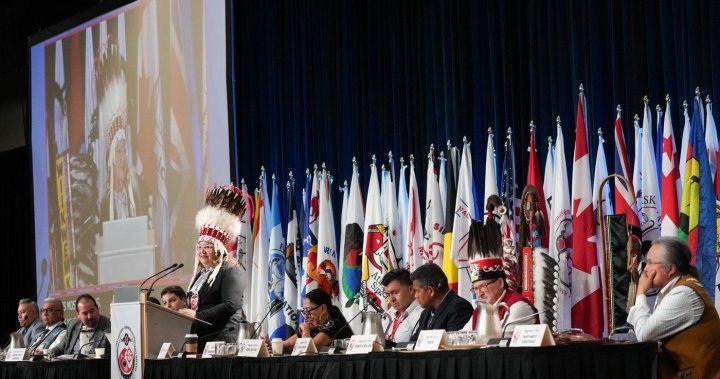First Nations chiefs are being urged to accept a $47.8 billion child welfare reform deal that was reached in July after a long legal battle over the federal government’s underfunding of on-reserve child welfare services. The deal came after the Canadian Human Rights Tribunal ruled that the underfunding was discriminatory and tasked Canada with reforming the system and compensating children who were removed from their families and placed in foster care. The representatives in the class-action lawsuit are encouraging the chiefs to vote in favor of the agreement at an Assembly of First Nations gathering in Calgary.
Despite the potential benefits of the deal, some chiefs have raised concerns about how it will work in practice. One representative plaintiff, Carolyn Buffalo, who is a mother from Montana First Nation in Maskwacis, Alberta, expressed her fear that the chiefs will reject the deal that she and others have worked on for years. Buffalo believes that if the agreement is voted down, it will leave First Nations children without protection and perpetuate Canada’s discrimination against them. The emotional plea from Buffalo highlights the importance of the proposed reforms in addressing the historic injustices faced by Indigenous children.
The $47.8 billion deal includes measures to improve the child welfare system on reserves, as well as compensation for the victims of the discriminatory practices. The agreement represents a significant step towards rectifying the systemic inequalities that have long plagued Indigenous communities in Canada. By accepting the deal, First Nations chiefs have the opportunity to bring about meaningful change and ensure the well-being of Indigenous children across the country, reinforcing their commitment to reconciliation and justice.
The vote on the child welfare reform deal at the Assembly of First Nations gathering in Calgary marks a pivotal moment in the ongoing efforts to address the injustices faced by Indigenous children. The decision of the chiefs will have far-reaching consequences for the future of child welfare services on reserves and the protection of vulnerable youth in First Nations communities. It is crucial that the chiefs carefully consider the implications of their vote and prioritize the best interests of the children who have been disproportionately impacted by discriminatory policies.
The emotional toll of the long legal battle and the fight for justice for First Nations children is evident in the voices of the representative plaintiffs, who have dedicated years of their lives to advocating for change. Their advocacy and perseverance have been instrumental in pushing for reforms and securing compensation for the victims of systemic discrimination. As the chiefs gather to decide on the landmark agreement, the voices of the plaintiffs serve as a powerful reminder of the stakes involved and the urgent need to address the legacy of colonialism and oppression that continues to affect Indigenous communities.
In the face of concerns and doubts surrounding the child welfare reform deal, it is essential for First Nations chiefs to carefully consider the implications of their decision and prioritize the well-being of Indigenous children. By voting in favor of the agreement, the chiefs have the opportunity to take a significant step towards rectifying the injustices of the past and ensuring a better future for generations to come. The outcome of the vote will shape the landscape of child welfare services in Indigenous communities and send a powerful message of commitment to reconciliation and justice for all.













